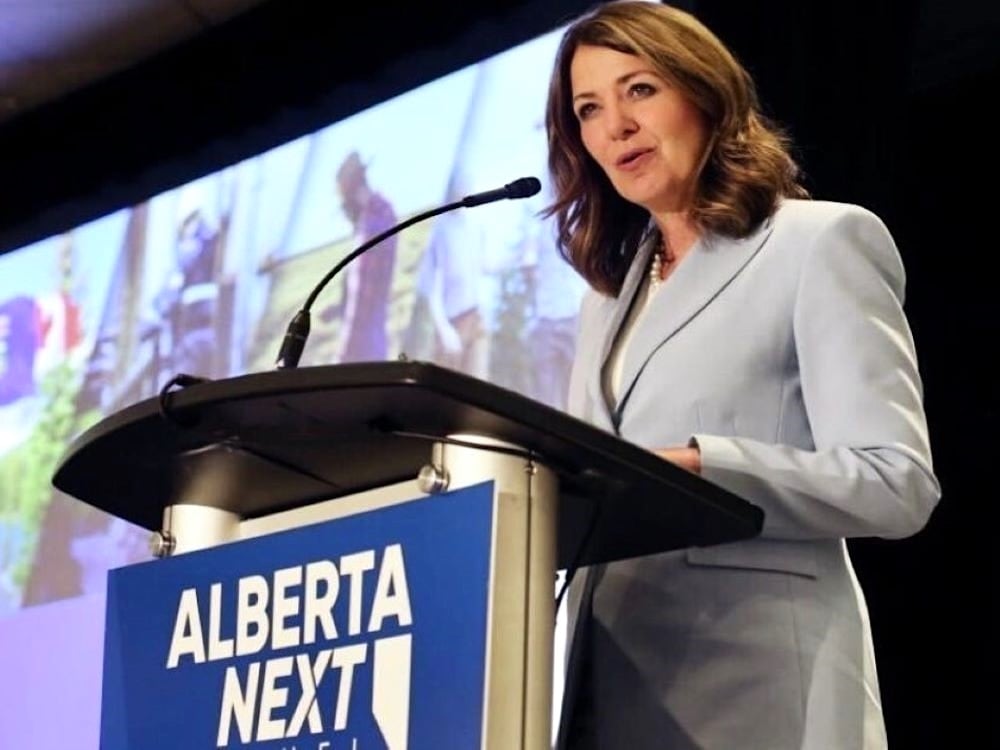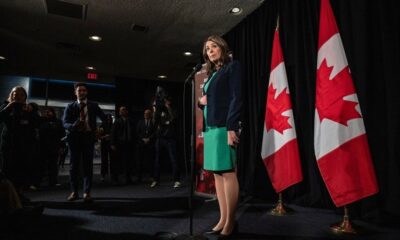Politics
Alberta Leaders Blame Immigrants for Economic Woes at Panel Event

A recent panel event in Alberta has reignited controversy surrounding immigration, as participants, including one prominent immigrant, directed blame towards newcomers for the province’s economic challenges. This discussion, part of the Alberta Next initiative created by Premier Danielle Smith, reflects a troubling pattern of rhetoric that has historically targeted immigrants during times of financial strain.
On July 15, 2025, at a gathering in Red Deer, approximately 450 attendees listened as Sumita Anand, a first-generation immigrant, expressed concerns over the impact of recent immigrants on job availability. Anand’s remarks echoed sentiments from the past, reminiscent of comments made by former Alberta Minister of Multiculturalism Dianne Mirosh in 1993, when she suggested that immigrants burdened the provincial welfare system.
Anand stated, “When I moved here to Alberta, 30 years back with two small kids, we moved because homes were unaffordable in Vancouver and Toronto and jobs were easily available. Now the struggle is we have these immigrants that are coming in, they are taking away our children’s and grandchildren’s jobs.” This assertion drew attention for its contradiction; Anand herself benefited from immigration policies during a time of intense scrutiny against immigrants.
Historically, the narrative of immigrants as economic burdens has been a recurring theme in Canadian politics. Audrey Macklin, an immigration scholar at the University of Toronto, noted that using immigrants as scapegoats is a tactic employed by populist politicians to deflect from more complex economic issues.
The economic backdrop of this discourse is significant. Alberta currently faces a projected deficit of $6.5 billion for the fiscal year ending in the spring of 2026, a stark contrast to the $8.3 billion surplus reported the previous year. Macklin remarked, “If you can embody it in immigrants, then you have somebody who people can grasp as a target, as a kind of cause of their hardship,” highlighting the ease with which politicians can redirect public frustration.
During the panel’s open-microphone section, a local resident expressed frustration over perceived disparities between immigrants and long-time residents. He claimed, “Why is it that the immigrants that are coming in now make $6,500 a month when I can’t even make that kind of money myself?” Such comments reflect a growing sentiment among some Albertans that immigrants are unfairly benefitting from social services, further fueling tensions.
The Alberta Next initiative, aimed at gathering public feedback on pressing issues, has faced criticism for its framing of immigration as a key concern. A video presented during the town hall directly linked immigrants to rising housing costs and unemployment, stating that Alberta now has the second-highest unemployment rate in Canada at 8.4 percent. This approach has raised concerns about its potential to foster a divisive atmosphere.
The panel’s discussions and survey initiatives have elicited strong responses from immigrant community leaders, who report an uptick in harassment and fear among newcomers. Shamaila Akram from the Calgary Centre for Newcomers noted that clients are experiencing severe anxiety and panic attacks linked to the hostile rhetoric. Kelly Ernst, also with the Centre, pointed out that the government’s narrative is exacerbating hostility towards immigrants.
In response to the criticism of the Alberta Next initiative, Smith’s press secretary reiterated that the number of newcomers entering Canada must be sustainable. He echoed familiar tropes about immigration, suggesting that past policies under former Prime Minister Justin Trudeau have contributed to current issues.
Macklin emphasized that the complaints directed at immigrants mirror those historically levied against various groups, suggesting that “the villains in the piece change over time, but the narrative is largely the same.” She noted that immigrants often fill essential, yet dangerous jobs that locals may not wish to undertake, further complicating the narrative of economic competition.
The implications of the Alberta Next panel’s discussions are profound. As the government grapples with financial challenges, the choice to scapegoat immigrants raises questions about the long-term consequences of such rhetoric. Macklin argues that while the government may not explicitly encourage violence, they are fostering an environment where xenophobia can thrive.
The Alberta Next initiative continues to receive scrutiny as it seeks to address pressing issues through a lens shaped by historical narratives. The challenge remains for Alberta’s leadership to engage in constructive dialogue that acknowledges the contributions of immigrants rather than using them as a means of political deflection.
-

 Politics4 weeks ago
Politics4 weeks agoSecwepemc First Nation Seeks Aboriginal Title Over Kamloops Area
-

 World5 months ago
World5 months agoScientists Unearth Ancient Antarctic Ice to Unlock Climate Secrets
-

 Entertainment5 months ago
Entertainment5 months agoTrump and McCormick to Announce $70 Billion Energy Investments
-

 Science5 months ago
Science5 months agoFour Astronauts Return to Earth After International Space Station Mission
-

 Lifestyle5 months ago
Lifestyle5 months agoTransLink Launches Food Truck Program to Boost Revenue in Vancouver
-

 Technology3 months ago
Technology3 months agoApple Notes Enhances Functionality with Markdown Support in macOS 26
-

 Lifestyle3 months ago
Lifestyle3 months agoManitoba’s Burger Champion Shines Again Amid Dining Innovations
-

 Top Stories2 months ago
Top Stories2 months agoUrgent Update: Fatal Crash on Highway 99 Claims Life of Pitt Meadows Man
-

 Politics4 months ago
Politics4 months agoUkrainian Tennis Star Elina Svitolina Faces Death Threats Online
-

 Sports5 months ago
Sports5 months agoSearch Underway for Missing Hunter Amid Hokkaido Bear Emergency
-

 Politics5 months ago
Politics5 months agoCarney Engages First Nations Leaders at Development Law Summit
-

 Technology5 months ago
Technology5 months agoFrosthaven Launches Early Access on July 31, 2025





















